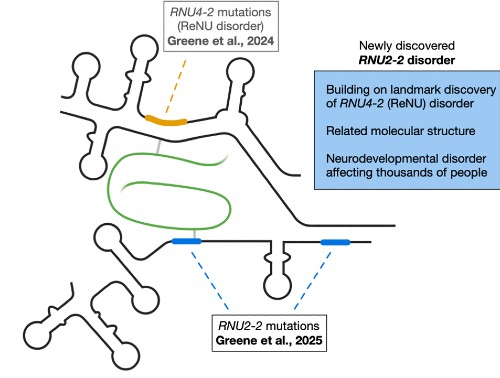NDDs are disorders that affect the development of the brain and nervous system. They include conditions such as intellectual disability, autism spectrum disorder, and motor disorders. These NDDs, which often have a genetic basis, manifest in early childhood and can lead to lifelong challenges in learning, behavior, and communication. The current findings involve a newly discovered form of NDD.
The study reveals that mutations in a small, previously overlooked non-coding gene called RNU2-2 are responsible for relatively common NDD. Non-coding genes are genes that don’t produce proteins but may still play critical roles in regulating cell functions. Importantly, the team’s findings show that these mutations tend to occur spontaneously, rather than being inherited from an affected person’s parents.
Building on their landmark discovery of RNU4-2 / ReNU syndrome last year, the research team has identified the new, related disorder caused by mutations in the non-coding gene RNU2-2. RNU4-2 / ReNU syndrome and RNU2-2 syndromes share similarities, but patients with RNU2-2 syndrome tend to be more severely affected by epilepsy.
Professor Andrew Mumford from Bristol Medical School at the University of Bristol and the senior clinical lead for the research, said: “Severe neurodevelopmental disorders are often devastating for children and their families. Achieving genetic diagnosis brings greater understanding and can be transformative for wellbeing and healthcare. Building on our previous discovery of RNU4-2 as a cause of NDD, our new discovery of RNU2-2 significantly reduces diagnostic uncertainty and will improve the care for thousands of affected families.”
Daniel Greene, PhD, Assistant Professor of Genetics and Genomic Sciences at the Icahn School of Medicine at Mount Sinai, and the study’s first author, added: “Our identification of RNU2-2 mutations as a cause of NDDs is particularly notable because it cements the biological significance of a class of small non-coding genes in NDDs. These mutations tend to occur spontaneously, rather than being inherited from an affected person’s parents.”
Advances in genetic sequencing, including whole-genome sequencing of more than 50,000 individuals by Genomics England, made the development possible. This enabled the researchers to identify the cause of the novel disorder as mutations in RNU2-2, a gene once thought to be inactive. The authors also identified a separate mutation in RNU2-2 that tends to arise in unaffected individuals as they age, which may have implications for age-related conditions.
Ernest Turro, PhD, Associate Professor of Genetics and Genomic Sciences at the Icahn School of Medicine at Mount Sinai, and the study’s Senior Author, added: “We estimate that the prevalence of RNU2-2 disorder is approximately 20 percent that of RNU4-2 / ReNU syndrome, one of the most common monogenic types of NDD. This means there must be thousands of affected families worldwide.”
Sarah Wynn, PhD, Chief Executive Officer of Unique, an organisation that provides support, information, and a voice for all those affected by rare chromosome or gene disorders, added: “We know from years of experience supporting patients and families with rare genetic conditions how receiving a diagnosis like this can be life-changing and the first step on the journey to putting in place the right support and care.”
The study was conducted by researchers at Bristol Medical School at the University of Bristol, the Icahn School of Medicine at Mount Sinai in New York, KU Leuven in Belgium;
in collaboration with colleagues from Spain, the Netherlands, and Iceland.
Paper
‘Mutations in the snRNA gene RNU2-2 cause a severe neurodevelopmental disorder with prominent epilepsy’ By E Turro et al. in Nature Genetics.
